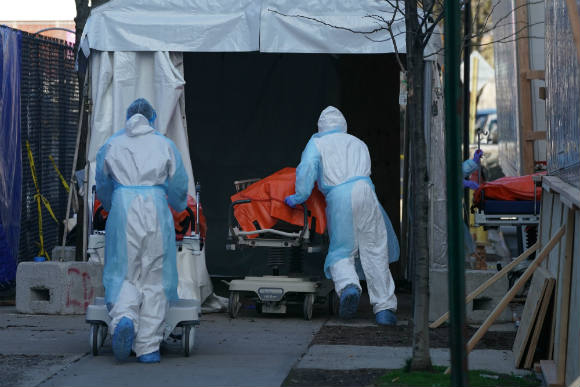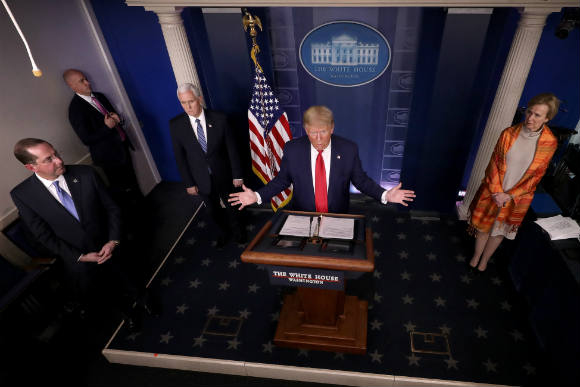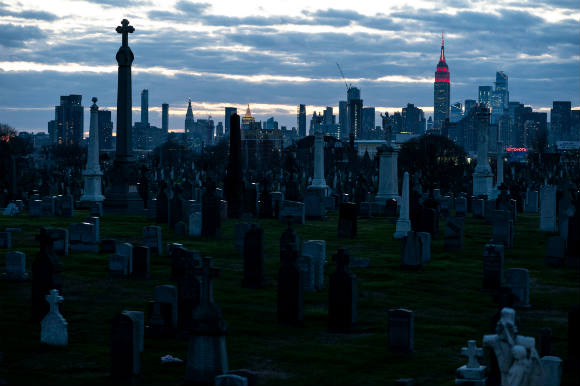The Hill’s Morning Report – Presented by Facebook – US officials expect ‘saddest week,’ glimmers of COVID-19 relief

Presented by Facebook

Welcome to The Hill’s Morning Report. It’s Monday. We get you up to speed on the most important developments in politics and policy, plus trends to watch. Alexis Simendinger and Al Weaver are the daily co-creators, so find us @asimendinger and @alweaver22 on Twitter and recommend the Morning Report to your friends. CLICK HERE to subscribe!
Total U.S. coronavirus deaths reported this week: Monday, 9,648.
“It was the best of times, it was the worst of times, it was the age of wisdom, it was the age of foolishness, it was the epoch of belief, it was the epoch of incredulity, it was the season of light, it was the season of darkness, it was the spring of hope, it was the winter of despair.” ― Charles Dickens, “A Tale of Two Cities”
Hours after administration officials urged Americans to prepare for the “hardest and saddest week” and President Trump predicted “a lot of deaths,” he insisted on Sunday that there is “light at the end of the tunnel” as the nation braces for more fallout from the coronavirus pandemic.
The president made his Sunday remarks as the White House cautioned Americans that the worst is ahead for many parts of the country, with New York remaining the equivalent of a five-alarm fire and other cities and states emerging as hot spots.
The death toll, public health officials explain, continues to climb during pandemics, even as new cases of infection begin to taper, which is the phenomenon of “flattening the curve” that infectious disease experts describe as the mitigation goal. Confirmed new infections during testing are the echoes of exposures that happened a week or more before. As new cases and hospital admissions decline, fatalities eventually follow.
“The next two weeks are extraordinarily important. This is the moment to not be going to the grocery store, not going to the pharmacy, but doing everything you can to keep your family and friends safe,” Deborah Birx, immunologist and public health adviser with the White House coronavirus task force, warned during Saturday’s televised briefing.
U.S. Surgeon General Jerome Adams appeared on “Fox News Sunday” to underscore Birx’s warning. “This is going to be the hardest and the saddest week of most Americans’ lives,” he said (The Hill and The Associated Press).

States: New coronavirus hot spots have been identified in Washington, D.C., Pennsylvania and Colorado, while New York, Louisiana and Detroit continue to account for many of the 337,646 confirmed cases of COVID-19 in the United States (NPR). Eight states do not have stay-at-home orders in effect (CNN).
New York: Gov. Andrew Cuomo (D) on Sunday said New York experienced a drop in new hospital admissions and a declining daily tally of deaths, which he called a “blip.” But if it holds, it could foreshadow relief in the Empire State from the ravages of the coronavirus, which has killed more than 4,000 people there (The New York Times). “You could argue that you’re seeing a slight plateauing in the data, which obviously would be good news,” Cuomo said during his daily briefing in Albany.
Louisiana: The Rev. Emmanuel Mulenga, pastor at Saint Augustine Catholic Church, in New Orleans, a nearly 200-year-old church in the city’s historically African American Treme neighborhood, gave out palm fronds on Palm Sunday to parishioners while still adhering to social distancing guidelines. He blessed the fronds and put them on a table near the back of the church where people could easily spot them. “Despite the social distancing … the spiritual aspects of our lives, faith, still continues, and I personally believe that under the present circumstances we need those personal connections and prayer even more,” Mulenga said (The Associated Press). … Louisiana Gov. John Bel Edwards (D), who has warned his state could be “the next Italy” in terms of COVID-19 spread, said on Sunday that the majority of the state’s 4,500 churches are adhering to orders not to convene in large groups, but he said the separation of church and state means his administration will not use law enforcement to mandate compliance from defiant pastors (The Advocate).
Washington: A state that was first to see COVID-19 infect its population is a beacon of hope for many other states as community-spread of the disease plateaus there. Washington on Sunday announced that it will return more than 400 ventilators to the Strategic National Stockpile after determining that the machines could be better used in states facing more dire conditions. Washington had 7,498 known cases on Sunday, with 319 deaths (The New York Times).

Vaccine dilemma: Ensuring the manufacture and distribution of enough eventual COVID-19 vaccine to everyone in the United States who needs it is the enormous undertaking Trump’s savviest advisers want him to get a grip on now, especially because everyone wants the world to return to work.
Who gets a vaccine when supplies are initially scarce? Who will own a vaccine in a world in which open science for pharmaceuticals is rare? How fast can a vaccine that is proved effective be manufactured and deployed?
Anthony Fauci, director of the Institute of Allergy and Infectious Diseases, recently told his colleagues at the National Institutes of Health during a videoconference that even if a vaccine is available next year, “I don’t think we’ll have enough doses for everyone” (ABC News).
Researchers believe those infected who recover from COVID-19 develop immunity that may fight off future infection for some period of years, but the coronavirus is expected to be seasonal and could develop into different strains in the future, a potential challenge for vaccine development. There is much about the disease that researchers say they need to learn, and Fauci has outlined ambitious plans to scale up a future vaccine (Bloomberg Law). The 79-year-old immunologist said on Sunday that the virus is unlikely to be eradicated this year (CBS’s “Face the Nation”).
Tom Bossert, a former national security adviser to Trump, said on Sunday that the president needs to look further down the road to get the United States prepared (The Hill). “He needs to be looking 20 yards, 200 yards and as far in front of his headlights as he can, or we’re going to end up having shortages or shortfalls in our vaccine manufacturing capabilities,” he said on ABC News.
Former Health and Human Services Secretary Mike Leavitt, who helped former President George W. Bush prepare in 2005 for a potential influenza pandemic, made the same point in March, citing his experience and lessons learned (Fox News).
“The goal of developing and stockpiling vaccines is simply stated, but not easily achieved,” Leavitt wrote. “Developing and stockpiling vaccines is not a job for any one government. It is not even a job for any one nation. It requires cooperation between nations, cooperation between different government entities within nations, and cooperation between governments and the private sector.”
Former Homeland Security Department official Juliette Kayyem, an author and national security analyst for CNN, wrote in The Atlantic last week that the question of distributing vaccines to the U.S. population, if left by the Trump administration to the 50 states to manage, will be agonizing.
“Everyone will be clamoring for it,” she predicted. “Medical professionals and first responders will go to the front of the line, as they should. But who goes next? Elderly people, who are more vulnerable, or healthy young people, who are more mobile, more likely to be infected without symptoms, and more likely to be working in jobs requiring contact with others? Those in urban areas, who are more likely to be exposed by casual transmission, or people all across a state? You or me? Decide quickly.”
There is some suggestion that the administration, behind the scenes, believes the country that develops a vaccine will control it. Many companies are racing to find a vaccine, and global researchers have been praised for open-science efforts to collaborate to unlock a cure that is safe and effective for worldwide use.
The New York Times in March described reports in Germany and some glimmers in the United States that the U.S. government sought to buy or bring a German biotech firm under U.S. control because of its promising early research on potential vaccine candidates for COVID-19 (“The Daily” podcast). The administration told the Times that such reports were “overblown.”
The Hill: Feds send ventilators to coronavirus hot spots around the country.
The Associated Press: Trump sees limits of presidency in avoiding blame for virus.
Axios: Trump administration officials sparred privately over the weekend about the therapeutic science behind hydroxychloroquine and COVID-19.
The Hill: Trump promotes use of malaria drug for coronavirus: “I’m not a doctor. But I have common sense.”
SPONSORED CONTENT — FACEBOOK
Support World Health Organization’s COVID-19 global response
Donations help WHO to prevent, detect, and respond to the COVID-19 pandemic. The Facebook company is matching the first $10 million donated, so each contribution goes further.
Donate to the COVID-19 Solidarity Response Fund.
LEADING THE DAY
CONGRESS: Democrats in Congress are expected to show voters this year how they’re combating a pandemic. Speaker Nancy Pelosi (D-Calif.) created a new committee to oversee the government’s coronavirus responses, while Senate Minority Leader Charles Schumer (D-N.Y.) wants Trump to appoint a “czar” to oversee the production and distribution of medical supplies. Rank-and-file Democrats are hunkered down with their families while holding virtual town halls, appearing on cable news shows, and answering questions on Facebook Live and other social media. Rep. Max Rose (D-N.Y.) has deployed with the National Guard to help set up field hospitals in New York, The Hill’s Scott Wong reports.
House Majority Whip James Clyburn (D-S.C.), the appointed chairman of Pelosi’s new bipartisan coronavirus committee, says the panel, which Trump has denounced as a partisan exercise, will examine the ongoing federal deployment of $2.2 trillion in stimulus funding (The Hill).
Meanwhile, a fourth legislative rescue package is beginning to be described by lawmakers from both parties. But Pelosi and Senate Majority Leader Mitch McConnell (R-Ky.) are publicly at odds about how soon to act and with what policies (The Hill).
“We’re not going to be doing, in the name of an emergency, items unrelated to the emergency,” McConnell told Fox News Radio when asked about talk of another legislative effort later this month.
Pelosi is impatient to act on what she has called “recovery” legislation to do more to buoy the economy and America’s workers. “The coronavirus is moving swiftly, and our communities cannot afford for us to wait,” she said on Friday.
Politico: Sen. Marco Rubio (R-Fla.) finds his next act.
IN FOCUS/SHARP TAKES
CORONAVIRUS & INTERNATIONAL: British Prime Minister Boris Johnson was hospitalized on Sunday as he continues to deal with COVID-19 symptoms 10 days after testing positive for the disease.
Downing Street said in a statement the move was a “precautionary step,” as he has had symptoms for 10 days, including a high temperature, but insisted that he was not being admitted due to an emergency. Carrie Symonds, Johnson’s 32-year-old pregnant fiancée, was symptomatic for much of the past week but is doing better (Reuters). As of this morning, the prime minister was undergoing tests, with Downing Street insisting that he remains in charge of the government (Reuters).
News of Johnson’s hospitalization came an hour after Queen Elizabeth II delivered a rare address to Britons. The 93-year-old monarch said in a four-minute address that the U.K. is enduring an “increasingly challenging time.”
“We should take comfort that while we may have more still to endure, better days will return,” the queen said. “We will be with our friends again, we will be with our families again, we will meet again” (The Washington Post).
The Hill: Trump sends best wishes to U.K. prime minister following hospitalization.
The New York Times: Boris Johnson hospitalized as queen urges British resolve in face of epidemic.
Reuters: Health Minister Matt Hancock says tighter coronavirus rules “not imminent.”
Reuters: Britain must not ease coronavirus restrictions too soon: Deputy CMO.

The Scottish government announced that Chief Medical Officer Catherine Calderwood will no longer be leading the messaging against the spread of the virus after she went against her own words of wisdom on social distancing and visited her holiday home in Earlsferry each of the past two weekends (Reuters).
> Italy: The death count in Italy started to plateau on Sunday after the national total grew by 525 — the lowest daily total in more than two weeks in the country with the most deaths worldwide. The death toll is on the verge of eclipsing 16,000.
Adding to the positive news, the number of intensive care patients dropped for the second straight day, while the increase in the number of reported cases from Saturday to Sunday fell compared to the prior 24-hour period. According to the latest statistics, there are 128,948 confirmed cases of the virus.
The total number of confirmed cases rose to 128,948 from 124,632 reported on Saturday, a lower increase than the day before, which added to signs the epidemic has reached a plateau nearly a month after the government imposed a countrywide lockdown on March 9 (Reuters).
Looking ahead, Italy is trying to figure out who has the right blood antibodies — a potential marker of immunity — as it may soon determine who gets to work and who does not, who is locked down and who is free (The New York Times).
> Japan: Prime Minister Shinzo Abe declared a state of emergency in Tokyo and six other major cities across the country today and the government is set to introduce a stimulus package worth hundreds of billions of dollars as the areas in question are on the verge of becoming hot spots.
The state of emergency is set to last for at least a month as the numbers are expected to soar in parts of the country, although the numbers are much lower than in other parts of the world. As of this morning, there are 3,654 confirmed cases and 85 deaths in Japan (Reuters).
> Africa: Public health experts are concerned that Africa could become ravaged by the coronavirus and become a catastrophe of unprecedented proportions.
As The Hill’s Reid Wilson writes, while there are only 6,575 confirmed cases across 49 African countries, according to the European Center for Disease Prevention and Control, the number of actual positive cases is likely far higher. Many African nations have little ability to test potential cases, and many Africans themselves do not have access to modern health facilities.
“The fear is that the numbers we’re seeing are a reflection of testing capability and people presenting symptoms at regular health facilities. A lot of people self-medicate, a lot of people use herbs, so we don’t know the full picture,” said Gyude Moore, a visiting fellow at the Center for Global Development and Liberia’s former minister of public works.
African nations have among the youngest populations in the world, due in part to a youth boom in recent decades. While that could help stanch the number of serious cases, widespread undernutrition and malnutrition put tens, if not hundreds, of millions of Africans at risk.
The Morning Report is created by journalists Alexis Simendinger and Al Weaver. We want to hear from you! Email: asimendinger@digital-stage.thehill.com and aweaver@digital-stage.thehill.com. We invite you to share The Hill’s reporting and newsletters, and encourage others to SUBSCRIBE!
OPINION
America was unprepared for a major crisis. Again, by Dan Balz, chief correspondent, The Washington Post. https://wapo.st/2UIBWW4
Bet big on treatments for coronavirus, by Scott Gottlieb, opinion contributor, The Wall Street Journal. https://on.wsj.com/2xM8BAZ (The Hill profiled former Food and Drug Administration commissioner Gottlieb HERE).
SPONSORED CONTENT — FACEBOOK
Keeping people safe and informed about COVID-19
Stay safe and informed during the COVID-19 crisis with the latest information from trusted health authorities like the WHO and CDC.
Visit Facebook’s new Coronavirus (COVID-19) Information Center for more.
WHERE AND WHEN
The House will hold a pro forma session Tuesday at 11:30 a.m.
The Senate will convene in a pro forma session at 10 a.m. Votes are not scheduled until April 20.
The president will have lunch with Vice President Pence at 12:30 p.m.
Pence will lead a video teleconference from the White House Situation Room with governors at 11 a.m. to discuss COVID-19 responses. In addition to lunch with Trump, Pence will lead a 3 p.m. meeting of the White House coronavirus task force and join the president during an evening media briefing.
Catch The Hill’s Campaign Report newsletter, with the latest from The Hill’s politics team. Sign up to receive evening updates, polling data and insights about the 2020 elections.
Hill.TV’s “Rising” program features news and interviews at http://digital-stage.thehill.com/hilltv or on YouTube at 10:30 a.m. ET at Rising on YouTube.
ELSEWHERE
➔ U.S. Politics: Former Vice President Joe Biden floated the possibility of holding the Democratic National Convention online due to the ongoing pandemic, even after the party announced that the convention got pushed a full month until mid-August (The Associated Press). … Michigan Gov. Gretchen Whitmer’s (D) profile has been on the rise throughout the COVID-19 pandemic, but it’s also boosted her stock with the Biden campaign, as some allies believe she could make a perfect running mate for the former VP (The Hill). … A number of political ads seizing on responses to the virus has some strategists worried that going negative at a time of crisis will backfire. While most of the ads have come from Democrats critical of the administration, Republicans are preparing to fire shots across the aisle, as well (The Hill).

➔ Lions & tigers, oh my!: A tiger at the Bronx Zoo has tested positive for the coronavirus. Other tigers and lions at the zoo also showed symptoms of the virus in what are believed to be infections triggered by an asymptomatic zoo worker (Wild Conservation Society and the Bronx Zoo). Cats have been described as more susceptible to the coronavirus than dogs (Nature). Two dogs contracted COVID-19 in Hong Kong but were asymptomatic (South China Morning Post).
➔ Chernobyl: As if the headlines are not grim enough on multiple continents, a forest fire is burning in the evacuated area around the Chernobyl nuclear power plant in Russia and is causing elevated radiation levels, authorities said on Sunday (The Associated Press).
THE CLOSER
And finally … Even in paradise, there are thorns during a pandemic. South African newlyweds Olivia and Raul De Freitas, who booked what they thought would be six romantic days of honeymooning in the Maldives in the Indian Ocean, can’t go home again — at least not easily.
“Everyone says they want to be stuck on a tropical island, until you’re actually stuck,” Olivia De Freitas said. “It only sounds good because you know you can leave.”
The De Freitas were the sole, pampered guests at a resort where their tab was eating into their savings, their affordable travel options are nonexistent, and quarantine and travel ban red tape in the Maldives and in South Africa is byzantine. By Sunday, they’d been moved by speedboat on orders of their government to a different five-star resort and told to wait for the next phase of the adventure, perhaps a trip home this week.
The photographs they’ve posted have been lovely. And the tale is one for the ages! (The New York Times).

Copyright 2023 Nexstar Media Inc. All rights reserved. This material may not be published, broadcast, rewritten, or redistributed. Regular the hill posts









